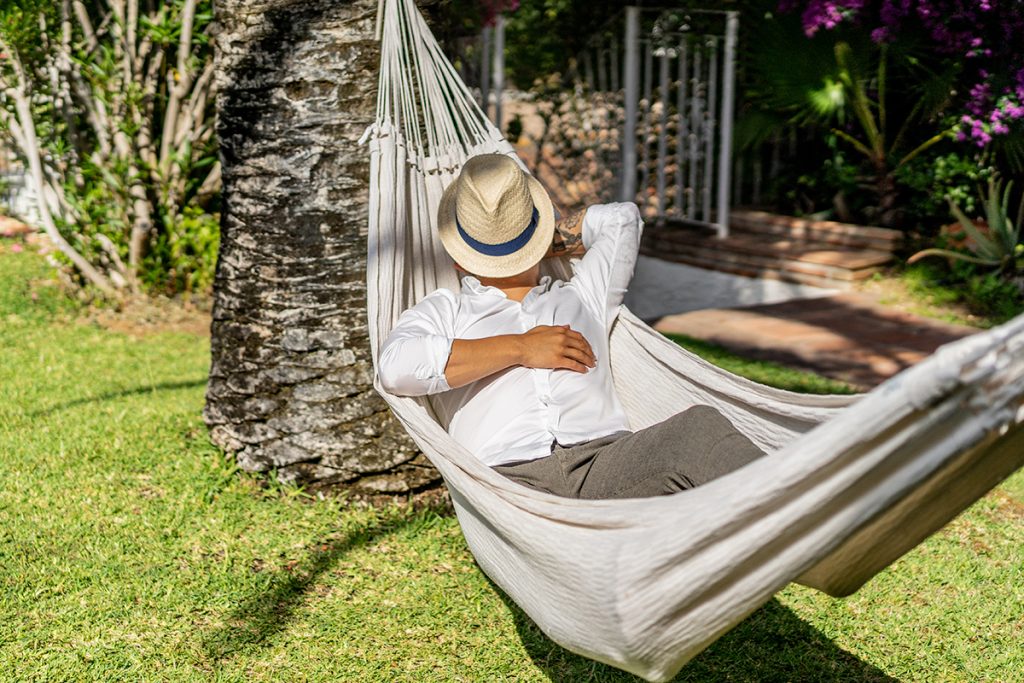
The Rest Is Best
By Lorna Foreman
Imposed or by choice?
The art of doing nothing. I don’t mean just lolling around eating chocolates or watching endless television. They all require “doing” something. However, there must be a balance in life — don’t you think? I personally feel that we are all like the Energizer Bunny: running, running, until we drop from stress or exhaustion.
My concept is a little different. Somewhere, I read a Zen saying: “Sometimes simply by sitting, the soul collects wisdom.” It was what prompted me to write on this topic.
We need that reflection time — what I call nondoing. After all, where do all those brilliant ideas come from? Some people get their inspiration from dreams — definitely, close to a ‘non-doing’ activity. I am one of those people and most of my best ideas come from these times and then I need time to reflect on them and nourish them.
I don’t believe it is the prerogative of seniors to sit and reflect (better than using ‘doing nothing’) at this stage of their lives. We all need to do that — even small children need their ‘quiet times’. It is true that more people are becoming interested in meditation, yoga and tai chi — but unfortunately the world is crazy, and it is often difficult to continue the calmness, when you
return to the chaos. I think one of the problems is that people generally associate doing nothing with being bored — but that is a whole different topic.
As I reflected on this topic, it also struck me that perhaps seniors often feel like doing nothing because the younger society groups don’t really expect older people to do anything. “Time to step back and leave everything to us” is the attitude.
Seniors often have a difficult time getting involved in some aspects of life. Try getting a paying job once you have reached 60 years of age, not to mention anything older than that. Often seniors have to create their own work. Why would a senior want a job when they could be sitting back and enjoying ‘doing nothing’? They don’t, but now have the opportunity to be selective in their activities — much wiser.
If I really twisted it around, I could make an argument that the younger group considers us to be invisible. Silly? Perhaps, but here’s a story that opened my eyes.
A friend of mine who is in his mid-70s, needed to go to a technology store. In fact, he ended-up there twice and the reaction both times was the same. He told me he needed service as well as information. To his surprise and dismay, the ‘young’ staff member walked around him, ignoring him, and yet greeted and served younger customers. My friend is anything but invisible; he is six-foot five-inched and distinguished looking. He had to actively pursue someone to get the help he needed.
Do the ‘young’ staff assume that a senior doesn’t use technology — or are they ignorant of who an older person is today? Not sure which is worse. Hopefully, that store is the exception. But since hearing that story, I have heard other seniors tell me that they, too, often feel invisible. It can’t just be the grey hair — it must be something else.
I certainly don’t feel invisible. Yet I, too, often find myself completely overlooked. Let me assure you, it is a strange sensation.
I used to live in Toronto and travelled the subway system. I was certainly a lot younger, but there were times on those subway platforms when I did not want to be seen, as there are some very strange people who do some strange things on those platforms. I would assume my little brown sparrow aura. It worked. I do not know what I did, except I pretended to be invisible. But that was done on purpose — not just being overlooked.
However, while doing nothing and reflecting, it occurred to me — could we use this to our advantage? Just think what we could get away with (and I don’t mean any criminal activities) just by being an invisible senior. Of course, there are now more surveillance cameras which do not render seniors invisible, but it does intrigue me. What mischief could we get away with by being invisible? Intriguing, no? Could we get away with totally outrageous behaviour? Could we walk into a store and completely change all the products around to confuse people?
Please don’t take me seriously on this, as I could get into a lot of trouble. Maybe that is what the poem When I am Old I Will Wear Purple is all about — you can wear weird clothing, be silly and know that nobody actually sees you — except for a fellow invisible senior. Hmm!
Lorna Foreman is a self-described 50-plus writer, author and artist who lives in Cornwall






